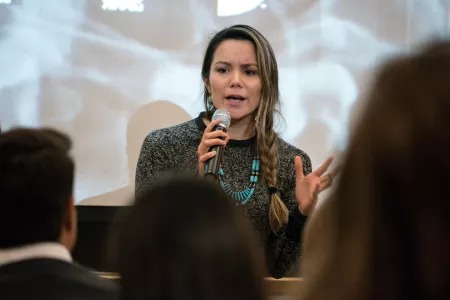Students Offer Innovative Ideas for Tackling Climate Change Impacts on Arctic
A competition hosted by the Belfer Center's Arctic Initiative elicited a range of solutions.
A competition hosted by the Belfer Center's Arctic Initiative elicited a range of solutions.
To much of the world, the Arctic is seen as a faraway, isolated region populated by polar bears and not much else.
“The truth is that the Arctic is so much more than that,” said Halla Hrund Logadóttir, a Co-founder of the Arctic Initiative at Harvard Kennedy School’s Belfer Center, during an Arctic Innovators event Wednesday at the Kennedy School.
The region’s four million people, spread among eight countries, are seeing their lives upended by rapid climate change, Logadóttir said, as communities are lost to rising sea levels and new oil, gas, and fishing resources open up for the first time.
The Arctic Initiative’s Arctic Innovators program allows students to develop ideas to tackle these challenges and improve the future of the Arctic, which has also become a bellwether for climate change worldwide. The program’s first cohort spent the semester working on their ideas through sessions with Arctic leaders and experts at Harvard Kennedy School and a field trip to Iceland, where they presented at the Arctic Circle Assembly, discussed their ideas with experts at the Arctic Innovation Lab and met the country’s president.
But Wednesday’s event, held in the Kennedy School’s Bell Hall, challenged the students to take a semester’s worth of work and condense it into a two and a half minute pitch.
Some proposals sought to utilize emerging technologies to meet the region’s unique demands — drones that would monitor glacier ice melt and deliver essential goods like food and medical supplies to remote populations; a digital library that uses virtual reality to share and preserve food production skills; a plan to use the Internet to connect displaced people with work they could do remotely and with little training.
Other ideas focused on using the power of national and subnational governments, acting alone or together, to enact change in the Arctic — a new free trade zone that would simultaneously create opportunities for cooperation on environmental regulations; having states and provinces take the lead in safeguarding marine biodiversity by creating a network of protected areas; setting up a fund for climate migrants by imposing a $1 levy on plane tickets in and out of the Arctic.
After the presentations, the audience — pitchers excluded — voted for its favorite, while a panel of judges did the same. The judges were Chris Colbert, Director of the Harvard Innovation Lab; Amanda Sardonis, Assistant Director of the Belfer Center’s Environment and Natural Resources Program; Alice Rogoff, a cofounder of the Arctic Circle Assembly and a Founder of Arctic Now; and Cristine Russell, a science journalist and Senior Fellow in the Environment and Natural Resources Program.
Though the judges were out of the room when the audience voted, both groups picked the same winner: Gabrielle Scrimshaw, who pitched an investment fund for ventures owned by Indigenous people, primarily in the booming tourism industry in northern Canada.

Tourism in the Northwest Territories already exceeds 200 million dollars per year with no signs of slowing down, Scrimshaw said.
“With 50 percent of the residents of the Northwest Territories being Indigenous people, you would think that many of these businesses being started would be owned by Indigenous communities,” she said as part of her pitch. “Unfortunately, that is not the case.”
Indigenous communities in Canada’s north often lack the access to capital needed to start tourism businesses, she said, but some Indigenous communities in other parts of the country “are sitting on millions of dollars of capital from land-sharing and resource agreements, looking for avenues to invest.”
“What’s incredible about this model is it drives economic independence in the region,” she added.
Scrimshaw, who grew up in Canada and is a member of the Hatchet Lake First Nation, said her idea came from working with Indigenous communities in the northern part of the country prior to pursuing an MBA at Stanford and an MPA at HKS. She also is co-founder of the Aboriginal Professional Association of Canada, which provides mentoring and networking opportunities to Indigenous professionals.
Scrimshaw is set to graduate from HKS in 2018. She said she wants to spend the spring semester working toward making the investment fund a reality.
“It’s been great,” Scrimshaw said of her participation in the Arctic Innovators program. “When I applied, I said, ‘This is a cool thing. I want to learn more about the Arctic.’ And now I’m here two months later and I can seriously start this and make this a business that I work on after I graduate.”
With Scrimshaw named the winner, Colbert of Harvard’s Innovation Lab closed the event with a pitch of his own, encouraging students to apply for its Venture Incubation Program to further develop their ideas and give them a chance to compete for a cash prize in Harvard University’s President’s Innovation Challenge.
“To survive, let alone thrive, every entity must innovate,” Colbert said. “Whether you’re a company, a country, a city, you have to innovate. And that includes people.”
Carozza, Jacob. “Students Offer Innovative Ideas for Tackling Climate Change Impacts on Arctic.” Belfer Center for Science and International Affairs, Harvard Kennedy School, November 20, 2017